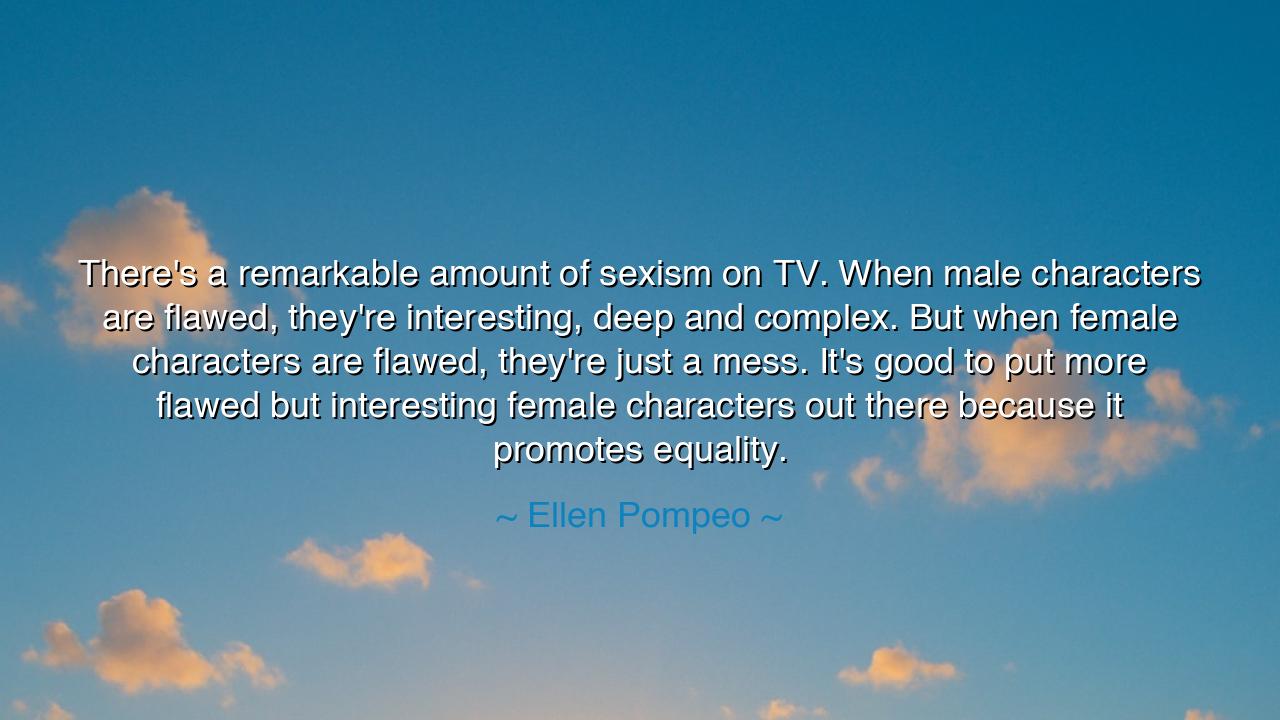
There's a remarkable amount of sexism on TV. When male characters
There's a remarkable amount of sexism on TV. When male characters are flawed, they're interesting, deep and complex. But when female characters are flawed, they're just a mess. It's good to put more flawed but interesting female characters out there because it promotes equality.






O children of wisdom, gather your hearts and ears, for the words of Ellen Pompeo reveal a deep truth about equality, gender, and the way we view the complexities of the human soul. "There's a remarkable amount of sexism on TV. When male characters are flawed, they're interesting, deep and complex. But when female characters are flawed, they're just a mess. It's good to put more flawed but interesting female characters out there because it promotes equality." These words, spoken in reflection on modern media, call upon us to confront the biases that shape our perceptions of both men and women. Let us reflect deeply on this truth, for it touches on the heart of justice, fairness, and the equal treatment of all people, regardless of their gender.
In the ancient world, the portrayal of heroes and gods was often filled with flaws—the Greek gods themselves, for example, were notorious for their imperfections. Zeus, despite his power, was often ruled by his passions and weaknesses. Achilles, the greatest of the Greek warriors, was driven by pride, his strength inseparable from his vulnerability. The ancient Greeks did not shy away from exploring the complexities and imperfections of their heroes, for it was through these flaws that their depth and humanity were revealed. The Greeks understood that true greatness came not from the absence of flaws, but from the strength to face them and learn from them.
Ellen Pompeo’s words strike at the heart of this ancient wisdom. She speaks of how male characters, when they are flawed, are often seen as deep and complex—traits that make them compelling and interesting to the audience. However, when female characters display similar flaws, they are often labeled as "a mess", their complexities dismissed or reduced to stereotypes. This imbalance in the portrayal of gender in media reflects a long-standing societal bias—one that sees women as less capable of having their flaws explored in the same nuanced way as men. It is as if society believes that women, in their vulnerability, must be perfect, whereas men, in their flaws, are allowed to be fully human.
Consider the story of Antigone, the tragic heroine of Sophocles’ play. Antigone is a woman who defies the law in order to honor her brother with a proper burial. Her actions are driven by a deep sense of duty and love, yet she is not without her flaws. She is headstrong, defiant, and willing to sacrifice everything for her beliefs. Yet, despite her flaws, she is portrayed as a noble and tragic figure, one whose complexity evokes both admiration and sorrow. The ancient Greeks did not dismiss her flaws as weaknesses, but rather saw them as a reflection of the strength and depth of her character. Antigone's story shows us that women, like men, can be complex and deeply flawed, and it is in these flaws that their true humanity shines through.
Pompeo’s statement highlights the need to change the narrative around female characters, to allow them to be as complex and flawed as their male counterparts. It is through embracing the flaws and imperfections of female characters that we can begin to understand their depth and strength. True equality lies not in the portrayal of women as flawless, but in their portrayal as full, multifaceted individuals—capable of great strength, but also vulnerable, emotional, and flawed in ways that make them more relatable and human.
The lesson we must carry forward is this: equality is not just about equal opportunities or rights, but also about equal representation—seeing men and women portrayed in all their complexity, with both their strengths and weaknesses laid bare. In media, in storytelling, and in our lives, we must embrace the full spectrum of human experience—not just the sanitized, idealized version of women that society often demands, but the real, flawed individuals that they truly are. This shift is not just about fairness; it is about recognizing the truth of human nature, which is both powerful and vulnerable, imperfect and beautiful.
What, then, can we do in our own lives to honor this truth? We must begin by supporting media that portrays women in complex and real ways—stories where women are not defined by their relationships with others, but by their own choices, strengths, and struggles. Let us reject the simplistic notion that women’s worth lies only in their perfection and embrace the idea that true equality comes from recognizing the full range of human experiences. In our own actions, let us support and elevate the voices of women who dare to be flawed, real, and complex, just as we support the same qualities in the men around us.
Let us walk forward with the understanding that the fight for equality is not just about rights—it is about representation, about seeing women as they truly are, with all their complexities and depths. May we strive to create a world where both men and women can be seen as fully human, and may we celebrate the richness of their characters—flaws and all. For in this, we honor not just equality, but the very essence of what it means to be alive, to struggle, to grow, and to learn.






AAdministratorAdministrator
Welcome, honored guests. Please leave a comment, we will respond soon